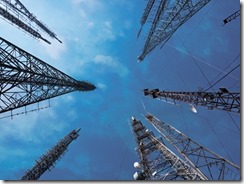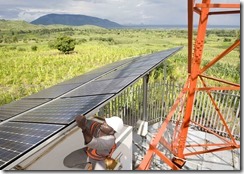An eye-catching development at Mobile World Congress in Barcelona this year, was the announcement that a total of eight network operator groups from across the Middle East and Africa had entered a memorandum of understanding (MoU) to facilitate an initiative to proactively explore greater cooperation with respect to infrastructure sharing.
The signatories to the MoU – Zain Group, Etisalat Group, Bharti Airtel, MTN Group, Ooredoo Group, STC Group, Orange, and Vodafone Group – account for the majority of mobile subscribers across the region, and the players have pledged to actively explore commercially negotiated agreements on passive infrastructure sharing, and where feasible from both technical and regulatory perspectives, active infrastructure sharing.
This agreement represents a huge step in the attitude of network operators to one another, as well as in respect to their perspective to the changing paradigms of the industry in which they remain the central figure. For now. Historically, network operators have preferred to directly control as much of their businesses as possible, and this has extended to infrastructure. However, in the past decade or so this viewpoint has been modified in the region through the uptake of outsourcing and managed services arrangements.
Network sharing is a concept that has existed in the industry for some time now, gaining momentum through the introduction of the first 3G networks at the end of the 1990s and early 2000s, though the fear of losing an aspect of competitive advantage resulted in network operators being shy to proactively seek out and engage in such arrangements early on. 
The boom in mobile broadband demand experienced across the region in recent years, correlated to the rise in smartphone and tablet penetration and the growing influence of over-the-top (OTT) players has represented both a profound threat and opportunity to network operators. As revenues from traditional voice and SMS decline, the rise in mobile digital services is a much needed source of incremental revenues, though the portion of the windfall that is required to be shared amongst third-party content providers is higher than what network operators ever had to contemplate in the past.
What the sharing MoU signifies is a move by network operators to shore up their own positions in the rapidly changing telecom sector of today, and appreciate that by rallying together, they stand a better chance of remaining relevant participants in the value chain rather than relics overtaken by social media and messaging companies such as WhatsApp and Viber. It may also prove to be the first credible step in the direction of services based competition, and away from infrastructure based structures.
The announcement of the acquisition of WhatsApp by Facebook effectively sucked the air out of the room at Mobile World Congress 2014 as this became the overriding topic of the event. And what a pertinent topic it was – how a company only founded in 2009 and employing fewer than 60 people could be valued at US$19 billion less than five years later, which is higher than the market capitalisations of a number of the network operators signed up to network sharing MoU.
What the valuation of WhatsApp signifies is that value in the telecom sector is shifting from network operators to social media, messaging, and Internet players that are effectively forging stronger, more financially rewarding relationships with communications consumers, and thereby assuming a larger proportion of incremental mobile digital services revenues. Such a development flies in the face of the massive upfront costs network operators have to incur in the purchase of spectrum and the capital expenditure on state-of-the-art network infrastructure.
A CEO of a network operator in the Middle East – which is not a signatory to the current network sharing MoU – stated that in 2005 telcos were investing 70 per cent of the entire ICT infrastructure spend and receiving back approximately 60 per cent of the free cashflows generated. He went on to quote that by 2 011, those figures had changed, with telcos still accounting for 70 per cent of the investment in ICT infrastructure, but with the free cashflows received from that capex down to just 11 per cent. One might predict that in 2013, that percentage of free cashflows had come down even further. 
So network operators have begun to appreciate that they need to rely more on their peers and forge their own counter measures to the new entrants to the telecom ecosystem. The Middle East and Africa is a phenomenal market in which to explore and expand this new paradigm given that the mobile subscriber penetration rate across this combined region stands at just 40 per cent, which remains lower than the global average of 47 per cent, and far below the hyper-saturation found in many developed markets.
The rampant appetite for mobile broadband access and content in the emerging markets of the Middle East and Africa are set to drive growth in telecom services for many years to come, and the network sharing agreement amongst the region’s largest network operators should be applauded not just for its recognition that network operators need to view themselves and their environments differently, but also for the efficiencies that such arrangements are likely to bring.
Total cost of ownership in the telecom space continues to fall and in order to be successful into the future, network operators need to make bold moves in the current environment to ensure they remain relevant in this dynamic and rapidly altering landscape.
This comment was published in the Financial Matters supplement of the Zimbabwe Independent newspaper, March 28, 2014 – http://www.theindependent.co.zw/





0 comments ↓
There are no comments yet...Kick things off by filling out the form below.
Leave a Comment